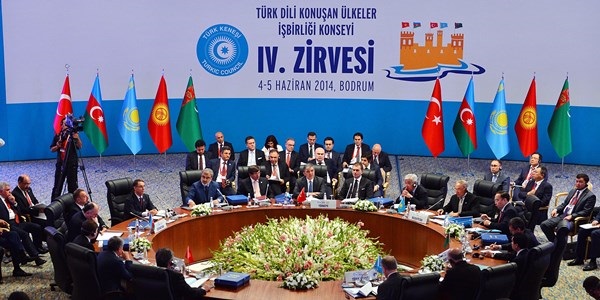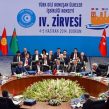
The Role of the Turkic Council for the Future of Eurasian Politics
Publication: Eurasia Daily Monitor Volume: 11 Issue: 124
By:

The Cooperation Council of the Turkic Speaking States (the Turkic Council) held its 4th Summit on June 5 in Bodrum, Turkey. The organization includes Azerbaijan, Kazakhstan, Kyrgyzstan and Turkey. One of the participants in the Bodrum Summit was Ramil Hasanov, former secretary general of the Turkic Council’s parliamentary assembly (TURKPA) and a young diplomat from Azerbaijan.
At the end of the summit, member states adopted the Bodrum Declaration, which included issues from tourism to security. The declaration reiterated support for Azerbaijan in the Nagorno-Karabakh conflict, expressed solidarity with the Turkish Cypriot people and support for settling the Cyprus problem based on the political equality of the two peoples on the island.
During the summit, Turkey informed participants about its recent efforts concerning the situation of the Crimean Tatars. However, most issues in the declaration were related to the Turkic Council’s internal matters. The Bodrum Summit took place at a time when several events have seriously affected the lives of Turkic people. The annexation of Crimea by Russia and the insurgency in Iraq have a profound impact on Crimean Tatars and Iraqi Turkmen. Although the Turkic Council considers them to be a historical part of the Turkic world, it avoided adopting a decision related to the current situation of its brethren in Crimea and Iraq (Bodrum Summit Declaration, June 5).
The Turkic Council was initiated in 1992 with the goal of developing multilateral cooperation among Turkic-speaking states. It was established at a time when the US encouraged Turkey to act as a "model state" for the former Soviet republics, as opposed to Russia and Iran.
Today, beside Turkey, Azerbaijan and Kazakhstan have gained economic self-sufficiency and have the political will to support the Council. Therefore, the organization is functioning with the support of member states rather than that of third parties. Despite the fact that it is considered more successful in the cultural field, its aim is to create an independent political unit in the region. Moreover, the Turkic states believe that there is a power gap in the Eurasian region that could lead to regional instability. They see the Turkic Council as an independent structure providing solidarity and support for their continued independence and sovereignty.
According to the Turkic Council secretary general, Halil Akinci, “when we talk about integration among the Turkic states, we should take into account their concern regarding independence” (Diplomatic Vision Journal, May 2011). Although not a member of the Turkic Council, Turkmenistan decided to attend the Bodrum Summit. Turkmenistan’s participation was very important as bilateral relations between Turkmenistan and Azerbaijan are crucial not only for the future of the Turkic Council, but also geopolitically in regards to energy security of the Caspian region.
While relations between Turkmenistan and Azerbaijan have been affected by some problems, Turkey-Turkmenistan relations are progressing. Turkey is trying to bring Turkmenistan closer to the West. The last six years saw six visits on the level of presidents of the two countries. At a joint press conference during Turkmen President Gurbanguli Berdimuhammedov’s last visit to Turkey on June 3, Turkish President Abdulla Gul stated, “We are maintaining our resolve to bring Turkmen natural gas via Turkey to Europe” (Rotahaber.com , June 3).
Turkey is trying to play the role of an arbiter between Azerbaijan and Turkmenistan to solve the problem between them. On May 26, a tripartite meeting between the foreign ministries of Azerbaijan, Turkey and Turkmenistan was held in Baku. After the meeting, they signed the Baku Statement affirming their commitment to improve relations in all spheres (Baku Statement, May 26). In addition, a meeting between Turkmenistan’s President Gurbanguli Berdimuhammedov and Azerbaijan’s President Ilham Aliyev also took place during the Bodrum Summit. Therefore, the attendance of President Berdimuhammedov in Bodrum was an important step toward integration of his country into the Turkic Council and resolving any problems between Turkmenistan and Azerbaijan.
Solidarity among the Turkic states is important for Azerbaijan for two reasons. First, such solidarity is critical for Azerbaijan’s energy and transportation strategy. Second, Azerbaijan generally prefers to participate in organizations where it is considered an equal member.
Another point related to the Turkic Council’s future is the position of Kazakhstan, which is the co-founder of the Russian-led Customs Union. This organization will transition to a Eurasian Economic Union in January 2015, but it is not quite clear which organization will have Astana’s loyalty in the future. Some experts argue that Kazakhstan supports the Turkic Council to counterbalance Russian-led organizations in the Eurasian region (KM.ru, October 15, 2012).
Kyrgyzstan is the weakest link in the organization with two consecutive political crises in 2005 and 2010 and continuous political instability. Turkey and Kazakhstan could help settle the country’s political and economic problems and Kyrgyzstan expects such help from the Council.
The absence of transport infrastructure directly linking the four members of the Turkic Council is one of their main problems. According to Halil Akinci, they could be linked via Iran and Georgia, but it is not clear whether Iran is interested in connecting with them or not. In order to resolve this problem, the Turkic states are trying to establish links via their respective ports on the Caspian Sea.
In the conclusions of the Bodrum Summit, the member states expressed their determination to maintain and strengthen cooperation in the field of tourism, economy, foreign policy, security and culture. Since the organization is still in the construction stage, member states are working on its institutional framework and avoid adopting decisions out of the Turkic Council’s geographic area. In the near future, its foreign policy agenda may focus more on problems outside the Turkic states. Another important issue on the foreign policy agenda includes cooperation with international bodies such as the Organization for Security and Cooperation in Europe (OSCE) and the Organization of Islamic Cooperation (OIC). Today, the main gap for the Turkic Council is that Turkmenistan and Uzbekistan are not yet members. Summit participants hoped that this issue would be resolved in time for the next summit to be held in Kazakhstan in 2015.




